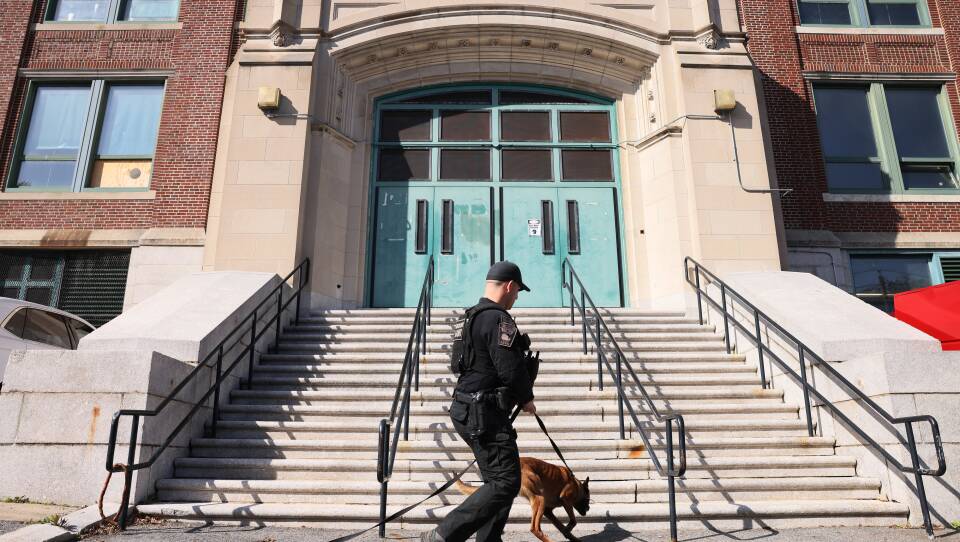The state's police accountability body decided Thursday that it will not routinely publish the names and assignments of all school resource officers on its website, but it will make that information available to the public upon request.
The commission also said it is still grappling with whether the names of students involved in disciplinary actions should be included in police reports, and if so, how to do that.
The Peace Officer Standards and Training Commission created in 2020 in the wake of the murder of George Floyd has the authority to create special certification standards for school resource officers. It had initially proposed publishing on its website the names and assignments of all school resource officers.
But Randall Ravitz, the attorney for the commission, said in a Thursday presentation that such a public list could cause security concerns for the officers. Instead, he offered alternate language that would provide for a member of the public to request that information be released. “That’s consistent with other things that the commission is doing, this would honor that, but provide for it to be done in a way that we could be careful about,” Ravitz said.
Commissioners voted unanimously in favor of proposed changes to the regulations.
But the commission came to no resolution on whether students’ names should be included in police reports, and how police departments and school districts should approach that topic in their operating agreements. It's unclear whether they can control that part of agreements between police departments and school districts when they're only tasked with coming up with certification standards for the officers.
Commissioner Larry Calderone pointed out the Boston Police Department is being asked not to identify any students that may need to be identified in a police report.
“The schools are asking in the [Memorandum of Understanding with the police department] to have that student identified as 'known to the Commonwealth' in all circumstances,” he said.
“Does that put our officers in a conflict, whether it be transparency-wise or more importantly, legally, with not identifying a person that could be involved in a crime within the schools? That that seems to be of grave concern,” he added.
Boston Public Schools removed school police officers in 2021 and replaced them with safety specialists.
Ravitz pointed to a provision in the 2020 law and said “it wouldn’t be appropriate to say, 'I think this person is part of a gang. And if you're keeping tabs on everyone who's involved in a gang, you should put this person on your list,'” he said. But he added that if there were more of a “law enforcement need,” then the student’s name could be added. "It really depends on the circumstances,” Ravitz said.
Calderone, who is president of the Boston Police Patrolmen's Association, said the issue they’re running into is “if a student is arrested on school property for carrying a firearm, should they be identified in the police report,” instead of the proposed “known to Commonwealth.”
“Our officers are concerned that’s not covering them legally and that we're not being fully transparent on the report that we're issuing,” he said, adding that it’s what they’re instructed to do at the police academy.
Commissioner Larry Ellison, a detective in the Boston Police Department’s School Unit who is working on the agreement with Boston Public Schools, said one of the compromises being looked at is using a student’s ID number rather than name.
“I think we would also still continue [using names] in situations of arrest or threatening situations,” he said. But he said that determination would be made on a case-by-case basis.
The commission is still wading through a series of other issues involving school resource officers.
There was a contentious public hearing in December over proposed regulations for certifying school resource officers. During that meeting, advocates for students expressed concerns that the proposal doesn’t define the role of a “school resource officer,” and that can create issues over whether police would be school disciplinarians when licensed mental health professionals could take on that role.
In Thursday’s meeting, Ravitz said the proposal would ensure that certification doesn’t expand the scope of a resource officer's authority beyond what the law allows for the job, and would create a process for suspending certification in the case of a community concern or complaint.
The commission also clarified that police officers wouldn’t need school resource officer certification to go into schools as mentors or for speaking events.
The POST Commission is also charged with implementing a mandatory certification process for law enforcement, including decertification and suspension of certification. It will adjudicate and investigate officer misconduct complaints from the public.





![Graduation 2024[64].jpg](https://cdn.grove.wgbh.org/dims4/default/21b7226/2147483647/strip/true/crop/1358x1358+637+0/resize/100x100!/quality/70/?url=https%3A%2F%2Fk1-prod-gbh.s3.us-east-2.amazonaws.com%2Fbrightspot%2F3a%2Feb%2Fd00d5cf6443ebee7970df751d611%2Fgraduation-202464.jpg)

